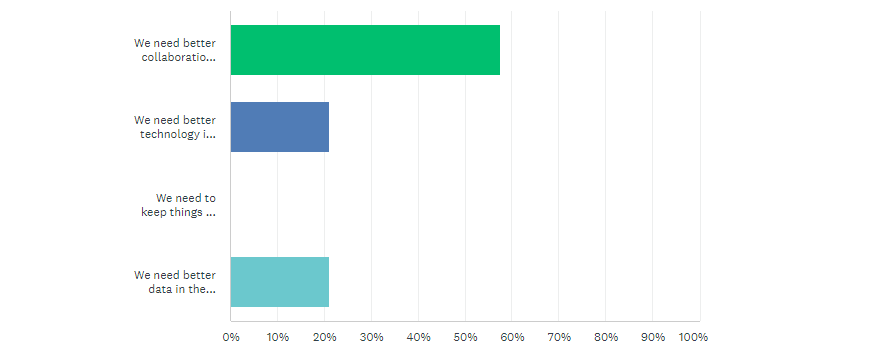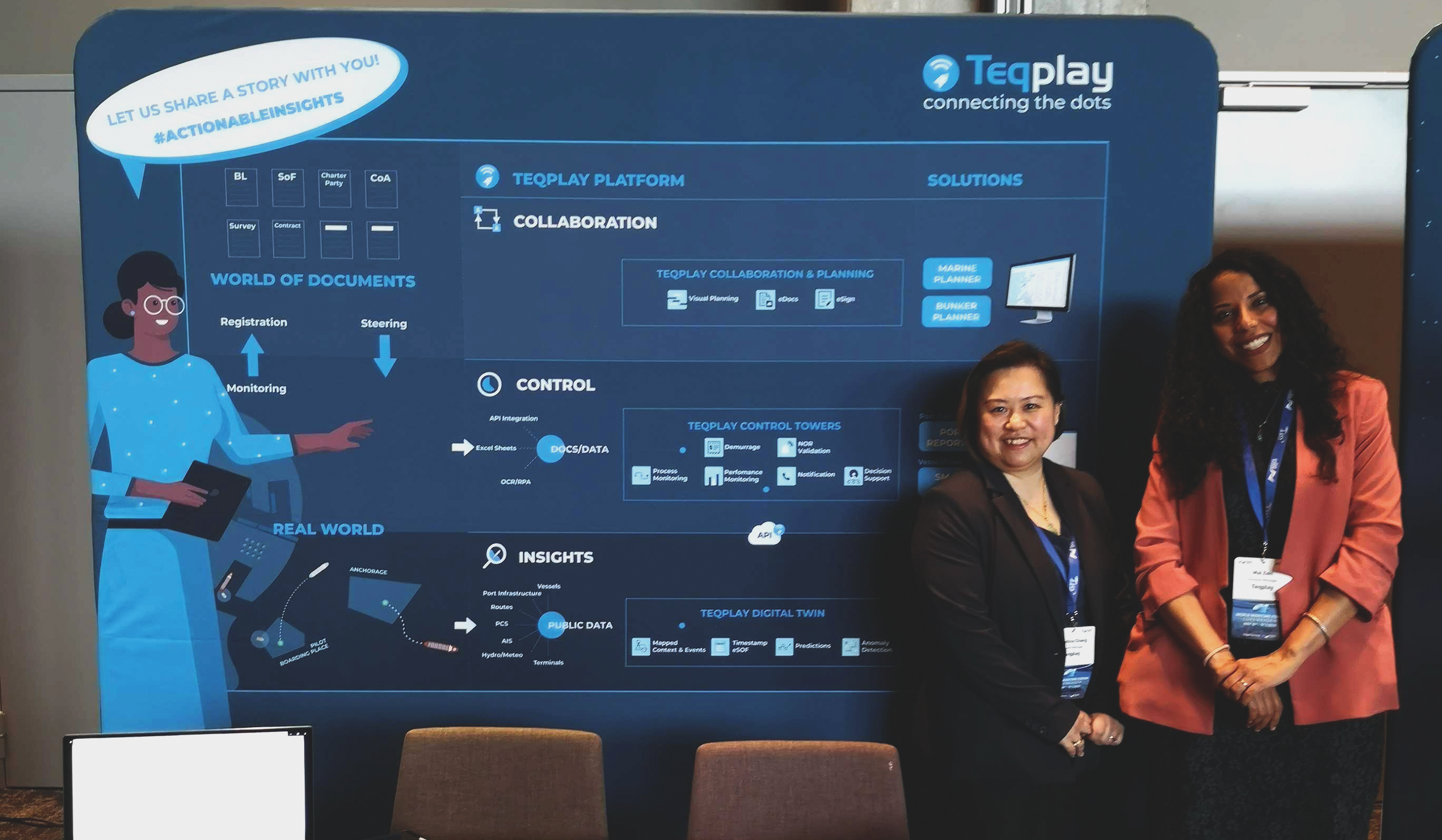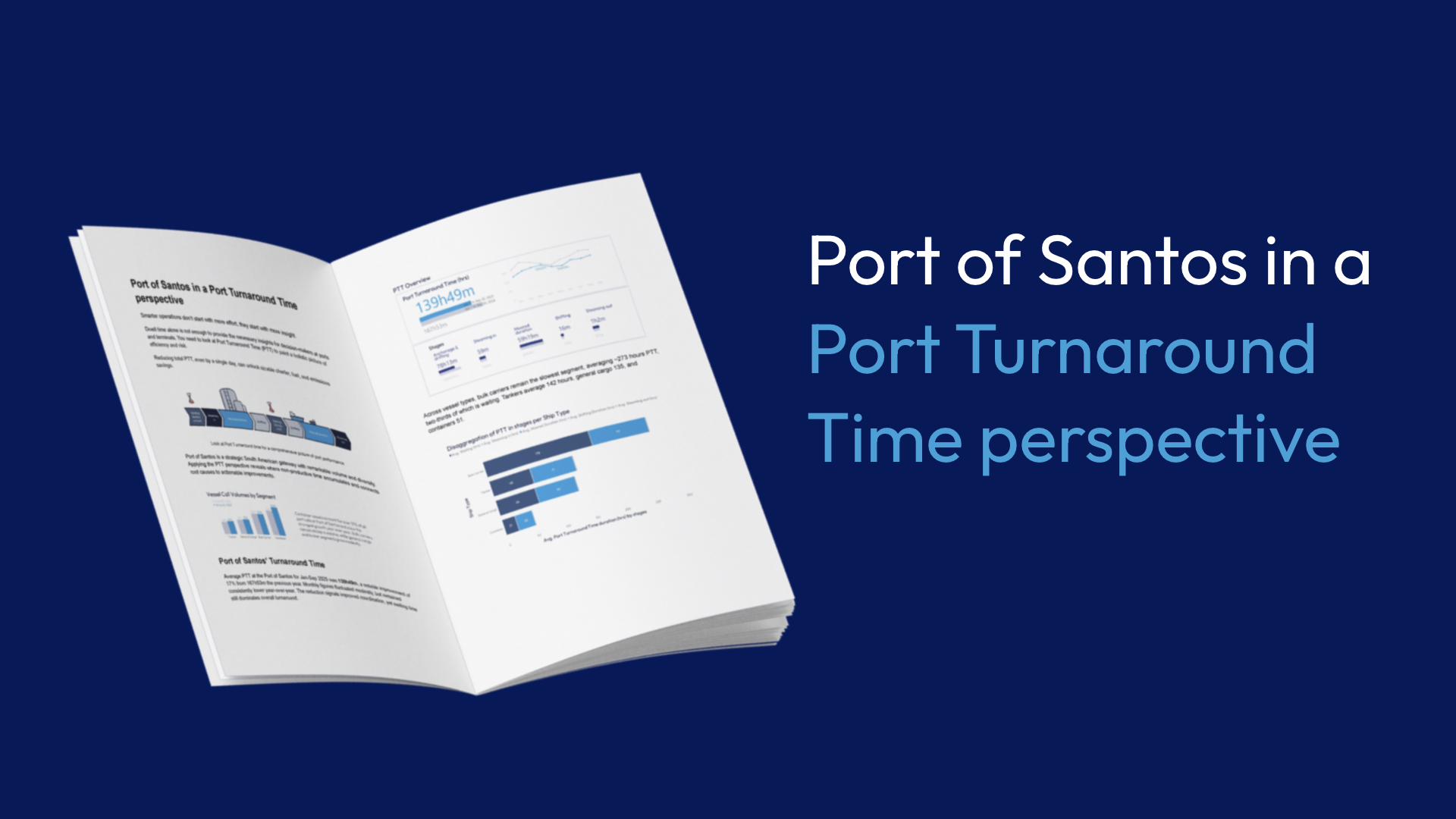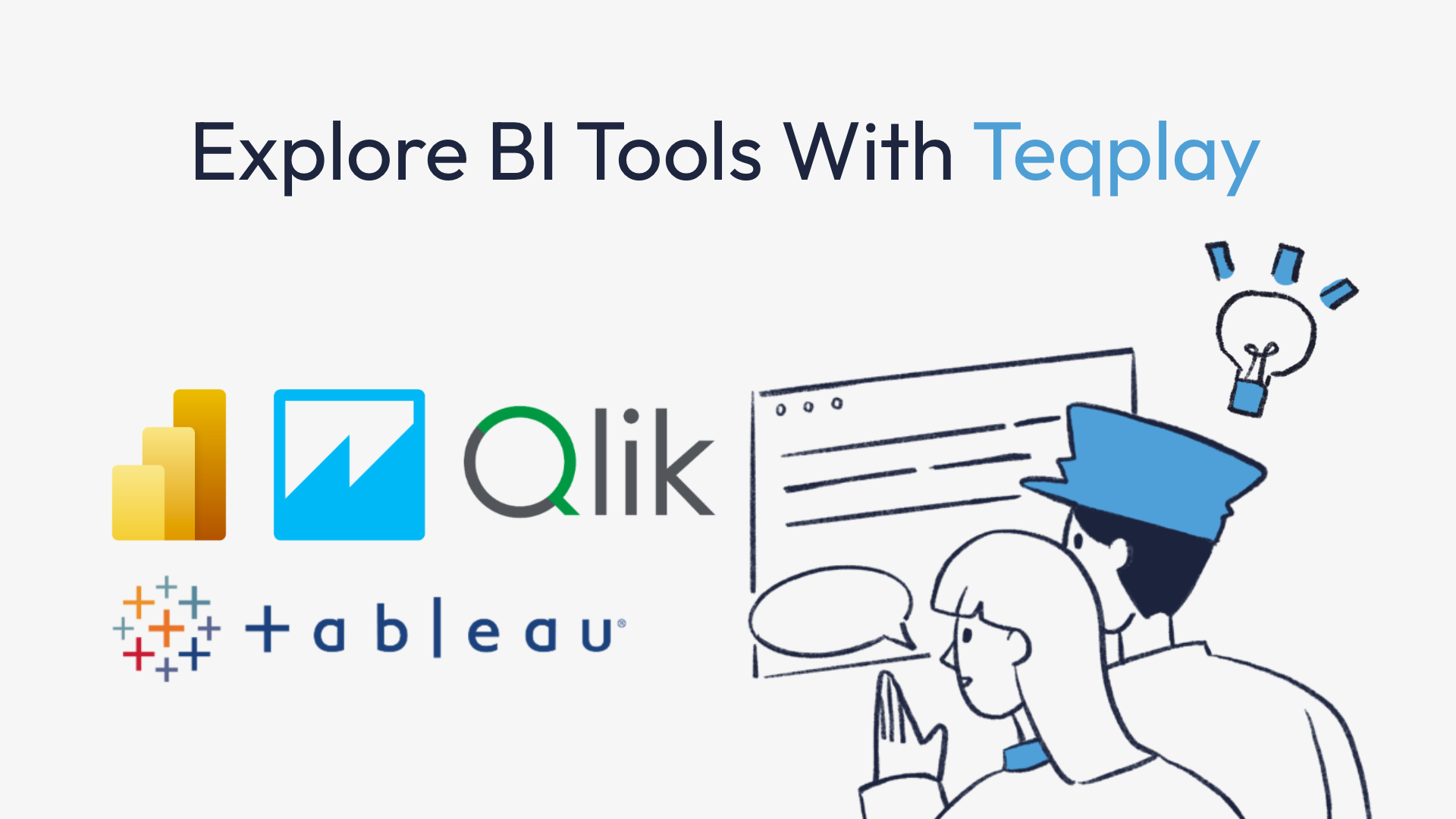The World Maritime Forum has been a great experience for Teqplay to come face to face with leaders and experts in the maritime industry. The Forum was a two-day international event in Copenhagen with 450 attendees and over 45 speakers, including intense panel discussions and companies presenting their vision and innovative solutions.
We took the opportunity to conduct a survey to gauge the level of interest in maritime innovation, collaboration, and port call optimization. Throughout the conference, we have spoken to more than 50 industry partners, and it was an interesting mix of participants.
Most of the participants we spoke with, consider themselves innovators and were at least open and willing to try new things. Respondents of our survey were in some way involved in the port call process and varied between shipping lines, charterers, port authority, terminals and suppliers. The majority were responsible for business development or operations in the industry.
Survey findings
1. We need better collaboration
Question: With what statement do you agree most?
- We need better collaboration in the maritime industry
- We need better technology in the maritime industry
- We need to keep things as they are in the maritime industry
- We need better data in the maritime industry

In the survey we conducted, some results were surprisingly insightful. For example, most respondents believe that we need better collaboration in the industry over better technology. On the other hand, the majority of respondents also believe that technology would change the industry within 5 years, as can be seen in the next question:
2. Technology will be the cause of future change
Statement: The maritime industry is going to change in the upcoming 5 years because of technology.

The overwhelming amount of data available nowadays has made it very important for everyone to be aligned and in-sync with one another. In fact, quite a number of respondents also note that we need better data first and foremost. Which is why, in order for new technological solutions to work, collaboration and an alignment in strategic thinking are undoubtedly necessary components.
Similarly, in an interview, industry expert Mikael Lind also agreed that a collaborative effort is necessary. “The basic premise is that you need to have everybody contributing to something called common situational awareness being updated in real-time – in other words sharing a common understanding of what is going on around us as it happens rather than in hindsight.” – said Mr. Lind.
Ultimately, this means that technological solutions need to be developed through collaboration, and conversely, innovation would be the driver of collaboration. One of the key takeaways of our survey is that collaborative innovation is the way forward in the foreseeable future.
All in all, the insights that were gathered give a clearer picture of industry leaders’ priorities. These insights would be helpful for those who wish to understand the current trends and debates within the maritime industry. Most importantly, this understanding would let us know what needs to be done to propel the maritime industry to a better future.
3. Is it possible to standardize?
Statement: Standardization in the maritime industry is impossible.

We also discovered that the question of standardization is quite a debate among those in the maritime industry. While the result shows that the majority of respondents thought standardization is a possibility, many others disagreed or were uncertain.
Ordinarily, maritime businesses would keep using solutions that have always fit them. While standardization might seem like an incredibly difficult task, it is still worth looking into standardizing practices for the sake of sustainability and further digitization. If the industry could come together on this, it would have a huge impact and improve the flow and connectivity of the supply chain significantly.
Although the idea of standardization seems to have been controversial, when it comes to optimizing the process of port call, our respondents agree that technological solutions are the way forward.
4. Technology is the solution to port call optimization
Statement: Port call optimization can be solved with technology.

While some were still skeptical about the use of technology to optimize port call operations, it is hard to deny that the use of technology has become more and more widespread. In order to keep up with the development of the industry, to meet sustainability goals and developed supply chain resilience, it is necessary to consider integrating innovative technologies in operations.
5. Agents are still necessary
Statement: There is no need for agents in the future.

Of course, the use of technology would not exclude human presence. Most participants in the survey thought that agents would still play a necessary role in operations in the future, especially as each destination has its own unique operations that require local knowledge. On the other hand, many respondents prefer to only have one agent for their port calls in order to save time:
6. Having one agent for all port calls helps save time
Statement: One agent for all my port calls will save me a lot of time.

While it would be more efficient to have a single agent to coordinate activities, this would only be feasible with the assistance of automation and technology. In the end, port call is still a complex process, and it is understandable that other respondents were unsure about having one single agent for their worldwide calls.
7. Quality data has a lot of worth
Statement: Shipping lines are willing to pay more if the information is uniform and data entry is prevented as much as possible.

We have seen some sentiment about better data in our previous question, and this question has really shown the importance of quality information and data for many customers. Also relating to the question concerning agents, for many within the industry, one of the ways that efficiency could be achieved is through the reduction of human error.
Improving data quality, reducing human error, increasing efficiency, and optimizing port calls would certainly enable solutions that could change and even disrupt the industry. However, collaboration would always lie at the heart of all possible solutions. New technologies and standardization would need to rely on the cooperation of those in the maritime industry in order to truly have an impact.
8. What needs to change to create a breakthrough in optimization?
Fill the blank: If this …. changes then we have a breakthrough in port call optimization.
We also asked participants to tell us the change they think is necessary to achieve a breakthrough in port call optimization. Many of the answers emphasize the importance of human factors in creating change. Trust, attitude, mentality, and mindset were all mentioned in participants’ responses.
Others pointed towards an optimum arrival schedule (Just in Time arrival), the ability to share data and having an accurate forecasting system. Some also mentioned pricing and salaries. All in all, the answers we received in this part of the survey seem to be quite in-line with what we have seen previously.
9. Is operational focus blocking improvement?
Statement: The operational focus of the industry is blocking the improvement processes.

We also found that many respondents think that the operational focus of the industry is one factor blocking the improvement processes.
This question seemed to have been somewhat controversial among respondents, since quite a number of answers indicate that they disagreed or were unsure about the statement we provided. With the focus on operational excellence within the industry the answer is understandable, every change is a risk. However with the challenges at hand the businesses also need to look for solutions outside of their comfort zone.
10. Sharing data is still difficult
Statement: Only when I take personal advantage, I am willing to share my data.

The question of data sharing has proved to be quite a debate as well, with an even divide between those who agreed and disagreed with our statement.
The reality is that, despite data sharing and collaboration being cited as crucial factors for change, most people are not entirely comfortable with sharing data. To many in the maritime industry, the data they hold could be their business advantage. There are many complications that could arise in the process of data sharing among organizations, and solving this conflict could be the key to improving collaborative efforts.
11. ETD is important
Statement: The ETD is important because it provides a direct financial gain.

In the maritime industry it is often stated that “the best vessel is the vessel leaving the port”. Activities within the port call are finished and new opportunities and business can be pursued, both for the shipping line and the terminal. Estimating the time of departure is considered the most difficult predictor; it adds up all the uncertainties within the port call. In order to improve predictive capabilities in port calling it is clear that the ETD prediction is the ultimate goal, and that data sharing would be of great value to improve the quality of the predictions. As expected, almost all participants consider accurate ETD to be beneficial, proving the importance of a good forecasting solution.
Summary & Conclusion
The agenda and the audience of the World Maritime Forum in Copenhagen demonstrated that the industry is open to and considering innovative solutions. The survey took a deeper dive in the area of port call optimisation and affirms this notion.
The key finding that stands out is belief that collaboration is the key and that technology is the basis and driver of the change. The quest for standardization is being recognized as an enabler for the change, but also as a blocker within the innovation process, as one of the respondents stated: “the wish to work and comply with standards is slowing the adoption of innovation and new technology. I know standardization is needed, but I would like to know what works first”.
The role of the agent is recognized by the participants and is expected to remain of value in the future. Standardization is recognized as valuable, therefore the choice of the participants to see the value of one agent for all port calls worldwide is logical.
Finally, there is no breakthrough without a cultural shift. Values like “trust”, “attitude”, “open mindset” are mentioned multiple times. The proof of the pudding in our belief is the willingness to share data. So let’s collaborate for a sustainable future.
Download Teqplay’s WMF Survey Report here

Léon Gommans | CEO/Co Founder of Teqplay
A serial entrepreneur who’s passionate about #innovation, #technology, #collaboration, and of course, #maritime. The mission is: to connect the dots & to get it to work, together with the industry!
- +31 (0)6 55306660
- leon@teqplay.com
- Léon Gommans




